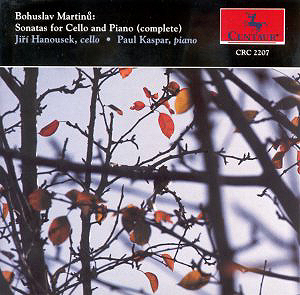Martinu's three cello sonatas span the years
from the flight from Paris to arrival in the U.S.A. to the return
to old Europe - though he was never to see his homeland again.
They are works of his rising and risen maturity.
The Parisian-based First Sonata partakes
of some of the drama of the contemporaneous Double Concerto. It
does not have quite the generosity of heart of the symphonies
nor the full-on concentrated intensity of the Double Concerto
(try Sejna's historic recording on Supraphon). The hesitancy of
the middle movement throws into relief the confident aggression
of the outer movements. Only two years later Martinu wrote his
Second Sonata. It was completed in Jamaica in the last
two months of 1941 with America now in the very war that Martinů
had fled two years ago. The second movement is sometimes doom-laden
in much the same way as parts of the second and third symphonies.
The allegro commodo already bears resemblances to
his optimistic Fourth Symphony though without quite the same luminosity
and liberation taking wing. The Third Sonata, though
written back in Europe, shows the confident 'sunrise' that arose
from his years in the U.S.A. The last movement is jazzily syncopated
without the desiccation of the Paris years. It finds time for
the plangent singing lyricism that is such a trademark of this
composer.
Both instrumentalists are fully engaged with
the spirit of these precious sonatas. I note that Centaur used
admirably adroit American soloists for their other two Martinů
chamber discs including Fredell Lack for the violin sonatas. This
is the only one of the three to feature a Czech player. Centaur's
presentation is good with English only notes. The only slight
criticism is the rather dry acoustic; a more lively result
would have added splendour to the tone of Hanousek's playing.
Rob Barnett
